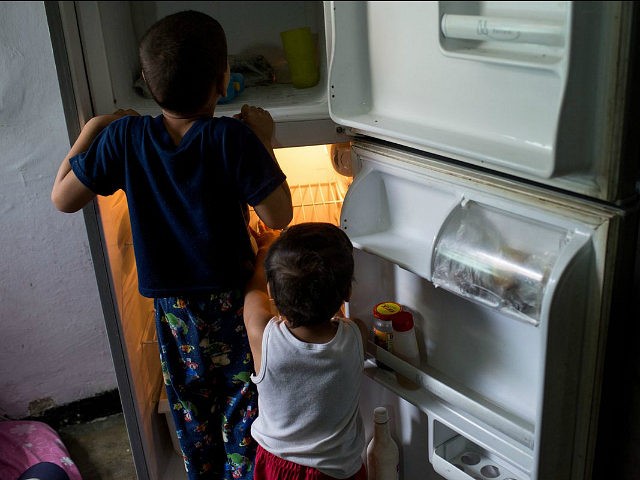Venezuela’s socialist president Nicolás Maduro has launched the Great Mission of Sovereign Supplying, a program which places the nation’s food supply in the control of the military, who will choose where to distribute the food and monitor ports accepting foreign food supplies.
Maduro announced the move Tuesday, appointing Minister of Defense General Vladimir Padrino López as the head of the program. As the BBC notes, the “great mission” will be able to “establish how purchases and distribution of food, medicine and household goods are made.” It will control five of the nation’s largest ports and regulate the function of the nation’s food processing plants.
Maduro explained the appointment of the military to control the nation’s dwindling food and medical supplies as a response to the “economic war” he alleges capitalist nations, especially the United States, are waging against his administration. The response to a war is, logically, deploying the military, he argued.
Padrino López has issued a public statement in response to criticism that having the military control the nation’s food supply will result is a systematic deprivation of those who oppose Maduro’s socialist government. The military will be “disciplining” the distribution of food and medicine, not “militarizing” it, he claimed. The Minister of Productive Agriculture, Wilmar Castro Soteldo, a likelier candidate to be running the nation’s food distribution, also issued a statement in support of the military’s takeover. “The country is in an abnormal situation,” he said, noting that the military “will be able to tend to agriculture production problems focused on the current war.”
The program will be replacing the local Supply and Production Committees (CLAP), a program that gave control of the nation’s food supply to local chapters of the United Socialist Party of Venezuela (PSUV). Castro Soteldo referenced the programs, asserting that the new policy does not mean the CLAP were “a failure,” but that it is a “strengthening of the same and lends more tools to its development.”
The CLAP was a widely unpopular program, as it gave socialist party leaders full discretion over who received food, encouraging hungry individuals to become more active participants in the party in exchange for a guarantee that they would receive one of a limited supply of 21-day emergency food packs. The opposition decried the CLAP program as a violation of the political rights of members of opposition parties.
Placing control of the food supply in the hands of the military could, however, lead to a different variety of corruption. According to an NPR report this week, food smugglers have been bribing border guards and National Guard soldiers to allow them safe passages from Colombia to hungry Venezuelans looking to buy food off the black market. The result of ramping up a military presence on the border while not allowing civilians to cross to shops in Colombia has been a boom for military food supplies and the black market.
Citizens rebelling and crossing the Colombian border illegally en masse forced the government to enact a 12-hour-only opening of the border on Sunday. An estimated 35,000 Venezuelans crossed to the other side to buy basic goods like flour, sugar, and milk, as well as medicine unavailable in Venezuela. Chavista politicians have been downplaying the good maintaining friendly relations with Colombia has done to those living within the border, however, alleging that “there is no hunger here” and those crossing into Colombia did so for “fun,” not to avoid famine.

COMMENTS
Please let us know if you're having issues with commenting.